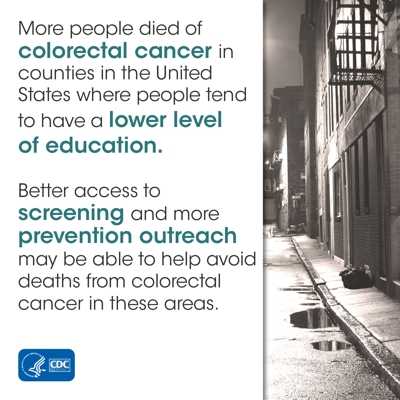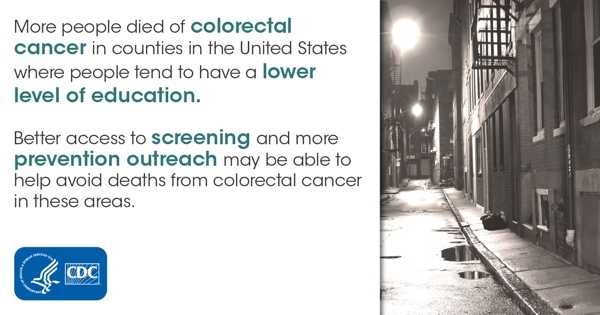Deaths from Colorectal Cancer in U.S. Counties with Lower Education Levels
People who live in counties with a lower average education level are more likely to die of colorectal cancer than people living in counties with higher education levels.
You should be screened (tested) for colorectal cancer, starting when you turn 50 years old, to lower the risk of unnecessary death from this disease. We know that getting screened can usually find the disease if you have it. If colorectal cancer is found before it advances too far, it can usually be treated successfully. However, getting screened is harder for some people than others, often because they may be less likely to see a doctor for a variety of reasons.
Unfortunately, a person who lives in a county in which many people get less schooling is less likely to get tested for colorectal cancer as recommended. When people are not tested as recommended, their cancer may be found at a later stage, when it is harder to treat. Because of this, people who live in counties with lower average education levels are more likely to die of colorectal cancer than people who live in counties with higher average education levels.
Key Findings
What these counties lose when people die of colorectal cancer when they don’t need to—
Lives
- From 2008 to 2012, a total of 100,857 people died of colorectal cancer in counties with lower average education levels.
- About 1 out of 5 (about 21,000) people who died from colorectal cancer while living in a county with lower than average education levels would likely have survived if they had lived in a county with higher education levels.
Labor and Money
Not only are deaths from colorectal cancer a great loss to the people’s families and communities, but most of these people worked, paid taxes, and bought groceries and other goods during their lifetimes. So, when someone dies too soon, not only does the community lose a resident, but the county also loses the work that person would have done and the money he or she would have spent.
- Every year, counties with lower average education levels lose about $2 billion worth of goods and services from the work of people who did not need to die from colorectal cancer.
- Counties with lower education levels usually are poorer counties, too. Losing the money they might have received makes these counties even poorer.
Citation
Weir HK, Li C, Henley SJ, Joseph D. Years of life and productivity loss from potentially avoidable colorectal cancer deaths in U.S. counties with lower educational attainment (2008–2012). Cancer Epidemiology, Biomarkers, and Prevention 2017;26(5):736–742.
Images to Share
You can copy and paste the code below to embed these shareable graphics in your Web site, social network profile, or blog.

- Page last reviewed: May 3, 2017
- Page last updated: May 3, 2017
- Content source:
- Maintained By:


 ShareCompartir
ShareCompartir

